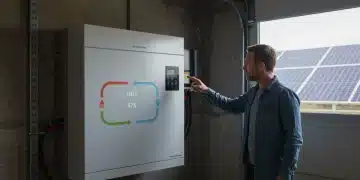Innovative solar battery solutions for a sustainable future

Innovative solar battery solutions provide homeowners with cost savings, energy independence, and enhanced sustainability through improved energy storage and integration with smart technology.
Innovative solar battery solutions are reshaping how we think about renewable energy. Have you ever considered how these technologies can power your home more efficiently? Let’s dive into the advancements that can make a difference.
Understanding solar battery technology
Understanding solar battery technology is crucial in our shift towards renewable energy. These systems store energy from the sun so that it can be used when sunlight is not available. This makes them an essential part of solar energy systems that benefit homeowners and businesses alike.
How Solar Batteries Work
Solar batteries function by capturing and storing energy generated by solar panels. During daylight, solar panels produce electricity, and any excess energy is then stored in batteries. When the sun sets or during cloudy days, the stored energy can be released for use.
Benefits of Solar Battery Technology
There are numerous advantages to using solar battery technology, including:
- Increased energy independence
- Reduction in electricity bills
- Usage during power outages
- Support for a more sustainable environment
This technology not only helps in saving costs but also reduces reliance on traditional fossil fuels. Many homeowners have turned to these systems, recognizing their value in providing consistent energy access.
Different types of solar batteries exist, tailored to various needs. Lithium-ion batteries are popular due to their efficiency and longevity. Conversely, lead-acid batteries are more affordable but tend to have a shorter lifespan. Understanding these differences can help consumers make informed choices about which battery best suits their energy needs.
Additionally, advancements in solar battery technology continue to emerge. New materials and computing technologies are making batteries more efficient and cheaper to produce. As innovation in this field progresses, we can expect even better solutions to arise, aiding in the management of renewable energy.
Benefits of solar batteries for homeowners

Homeowners are increasingly turning to solar batteries for various reasons. These systems provide energy storage that enhances the efficiency of solar power usage. With the ability to store excess energy generated during the day, homeowners can use it at night or during cloudy days.
Cost Savings
The financial benefits of investing in solar batteries are significant. By using stored energy, homeowners can lower their electricity bills. Many utility companies offer programs that reward homeowners for using less grid energy, translating into even more savings over time.
Energy Independence
A primary advantage of solar batteries is increased energy independence. By relying on stored solar energy, homeowners can reduce their dependence on traditional energy sources. This is particularly beneficial during power outages when grid power is unavailable.
- Provides power during outages
- Reduces reliance on fossil fuels
- Enhances overall system efficiency
- Supports a sustainable lifestyle
Additionally, solar batteries can contribute to environmental sustainability. By storing clean energy from the sun, homeowners can help reduce carbon footprints and promote the use of renewable resources.
Another appealing aspect of these systems is the technological advancements making them more accessible and efficient. As technology continues to evolve, solar batteries are becoming more affordable, with longer lifespans and better performance. These improvements are making solar installations more attractive to a broader audience.
Incorporating solar batteries into home energy systems not only supports individual financial goals but also fosters a larger movement towards a sustainable future. Homeowners can play a key role in the transition to renewable energy.
Comparing different solar battery options
When it comes to solar battery options, homeowners have several choices. Each type of battery has its own strengths and weaknesses. Understanding these differences is key to selecting the best fit for your needs.
Lithium-Ion Batteries
Lithium-ion batteries are currently the most popular choice for solar systems. They are known for their high efficiency and long lifespan. These batteries can discharge and recharge quickly, making them ideal for residential use.
Lead-Acid Batteries
Lead-acid batteries are a more affordable option but come with some trade-offs. They typically have a shorter lifespan and lower efficiency compared to their lithium counterparts. However, for those on a budget, they can still provide a reliable energy storage solution.
- Lower initial costs
- Proven technology
- Reliable performance
Understanding these two options can help you determine the best fit for your home energy system. Another type worth considering is the saltwater battery, which is newer to the market and emphasizes eco-friendliness.
Saltwater Batteries
Saltwater batteries utilize saltwater as the primary electrolyte, which makes them safer and less harmful to the environment compared to traditional batteries. Although they are still developing in terms of availability, they represent a promising option for environmentally conscious consumers.
Ultimately, when comparing solar battery options, it’s essential to consider factors like cost, efficiency, and environmental impact. This knowledge will help you make a wise investment in your solar energy system, ensuring that you have the best battery for your needs.
Future trends in solar battery innovation

The future of solar battery innovation looks very promising as technology continues to advance. With growing concerns about climate change and energy efficiency, researchers are focusing on developing more effective and sustainable battery solutions.
Improved Energy Storage Technologies
One of the key trends is the enhancement of energy storage capabilities. New designs, such as solid-state batteries, are being explored. These batteries have a higher energy density, which means they can store more energy in a smaller space.
Integration with Smart Home Systems
Another important trend is the integration of solar batteries with smart home technology. This enables homeowners to monitor and manage their energy use more effectively. Smart systems can optimize energy flow, ensuring that homeowners use solar energy when it’s most available.
- Energy consumption tracking
- Automated switching between grid and solar
- Enhanced solar battery maintenance
Additionally, the development of battery recycling programs is gaining traction. As more solar batteries are used, finding ways to recycle the materials will help reduce environmental impacts. This initiative can lead to a circular economy in battery usage, where materials are reused rather than discarded.
Public interest and demand for renewable energy solutions are driving innovation. Companies are investing in research to make solar batteries more affordable and efficient. As competition in the market increases, consumers can expect to see lower prices and better performance.
As advancements continue, we may also witness new battery chemistries that offer safer alternatives and less environmental impact. These innovations will play a crucial role in helping more people transition to renewable energy sources.
FAQ – Frequently Asked Questions about Innovative Solar Battery Solutions
What are the main benefits of solar batteries for homeowners?
Solar batteries offer cost savings, energy independence during outages, and a more sustainable energy solution by utilizing stored solar energy.
How do different types of solar batteries compare?
Lithium-ion batteries are efficient and long-lasting, while lead-acid batteries are more affordable but have shorter lifespans. Saltwater batteries offer eco-friendly alternatives.
What future trends can we expect in solar battery technology?
We anticipate improvements in energy storage, integration with smart home systems, and the development of more sustainable materials and recycling programs.
How can I determine which solar battery is best for my needs?
Consider factors like your energy consumption, budget, and whether you want advanced features like smart integration when choosing a solar battery.





